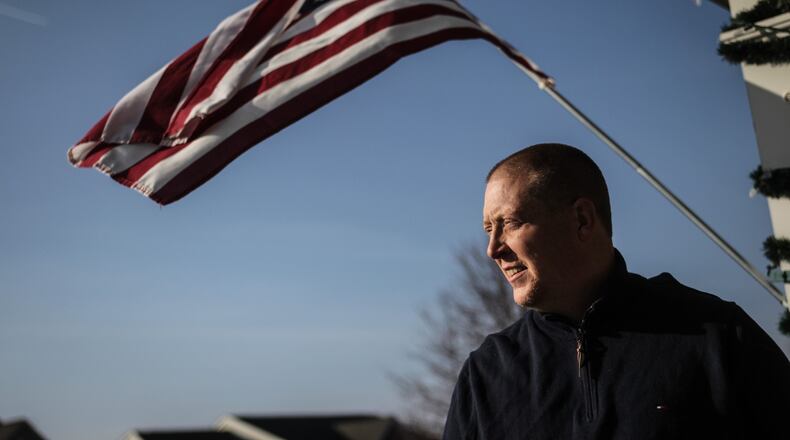Garrison,43, his 5-year-old son Max and Luke were returning home from the park when someone ran a red light and hit their truck, flipping it on to its side and spinning the vehicle 180 degrees.
His son burned his neck from his car seat seatbelt. Luke hurt his hip and cut his chin and paw. Garrison suffered an injury to his shoulder.
“I had a flash back to Iraq. I was trying to get my jacket off and I spun around, and I was looking for a bunker,” Garrison said. “Even though Luke was hurt, he was still nudging at me to help me out. I still have a hard time going through that intersection. It’s been almost a year, and my heart rate still increases when I travel through that intersection.”
Luke brought Garrison out of that flashback and into the present, where he was able to get his son, Luke and himself out of the car.
Garrison has had Luke since 2016. Garrison injured his spine in Iraq and deals with chronic pain, anxiety, depression and post-traumatic stress disorder. Luke, a 6-year-old black lab, will nudge Garrison or put his head on Garrison’s leg to stop him from having anxiety attacks. Luke came to the Garrison family from Warrior Canine Connection. He recently won an award for service dog excellence from AKC Humane Fund Awards.
“Luke is one of the family members,” Garrison said. “If it weren’t for him, I would still be in a dark place.”
On Luke’s Facebook page, he can be seen often playing with Garrison’s sons Mitchell, 7, and Max or taking a nap with Garrison.
Garrison said the worst thing about 2020 was that car crash. He is looking forward to 2021 because he and his wife are starting a nonprofit, called Valor Therapeutics, to help veterans and first responders with creative art therapies, like art therapy and music therapy.
Garrison’s wife, Julie, is a board-certified music therapist. She has worked as a therapist for more than a decade, including at Walter Reed National Military Medical Center. This is where Julie got introduced to Warrior Canine Connection.
“We wanted to offer this as a way to increase access to services and improve wellbeing.” Julie Garrison said. “Luke was not traditional therapy. Traditional talk therapy was not effective (for Ryan). And he didn’t want to be on medicine because of the way it made him feel. So I said, ‘let’s look outside the box,’ and he was paired with Luke and it has made all the difference.”
The plan is for Valor Therapeutics to take clients if they’re already in treatment, to compliment other treatment, Julie Garrison said. Valor Therapeutics will help active duty military, veterans, first responders and retired first responders. Sessions will be online to begin with. The Garrisons have partnered with Beavercreek Baptist Church, which is allowing them to use their fellowship hall for free, for when they are having group sessions.
“With what’s happened in Dayton over the past two years, we really need (first responders). We want to offer this to them,” Julie Garrison said. “ Creativity is a helpful communication tool. When words fail, music speaks.”
Julie Garrison said this kind of therapy is not currently being done for veterans and first responders in the Miami Valley.
One of the first things they plan to do with clients is to paint a guitar. The front of the guitar is to be painted with what they show the world and the back is to be painted with feelings or thoughts they hide, Ryan Garrison said. Clients would then string the guitars and write music or improvise on them.
“It’s a metaphor for life,” Julie Garrison said.
Valor Therapeutics is looking for guitar donations. If you have an old guitar you’d like to donate, send it to Valor Therapeutics at PO box 340616 Dayton, Ohio 45434 or visit Valor Therapeutics’ Facebook page.
Ryan Garrison said it is important that people like him have the courage to seek help, especially in a year like this.
“One of the reasons I was apprehensive about getting Luke, was walking around with a service dog with a vest, people look at you and know there’s something wrong with you and I didn’t want that stigma on me and that’s why I was hiding my PTSD for so long,” Garrison said. “When somebody signs the bottom line to be in the military or be a first responder, it is courage that does that. And so they have to draw on that characteristic to seek help. Have the courage to stand up and admit you need help.”
About the Author

